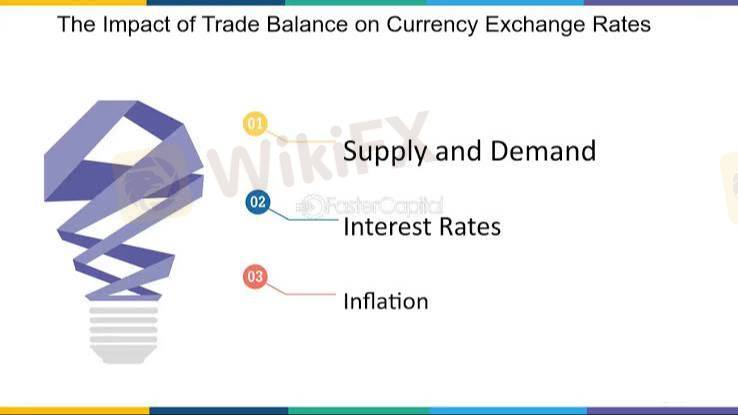
2025-02-13 15:42
IndustryThe impact of trade balances on forex trends and l
#firstdealofthenewyearastylz
Trade balances significantly influence Forex trends and can result in losses if not properly understood. Here's a detailed explanation:
What is a Trade Balance?
A trade balance, also known as a trade deficit or surplus, is the difference between a country's imports and exports.
How Trade Balances Impact Forex Trends:
1. *Trade Deficit*: A trade deficit occurs when a country imports more than it exports. This can lead to a decrease in the value of the country's currency.
2. *Trade Surplus*: A trade surplus occurs when a country exports more than it imports. This can lead to an increase in the value of the country's currency.
3. *Currency Devaluation*: A large trade deficit can lead to currency devaluation, making imports more expensive and potentially fueling inflation.
4. *Currency Appreciation*: A large trade surplus can lead to currency appreciation, making exports more expensive and potentially reducing demand.
Factors Influencing Trade Balances:
1. *Exchange Rates*: Changes in exchange rates can impact trade balances by making imports more or less expensive.
2. *Tariffs and Trade Agreements*: Tariffs and trade agreements can influence trade balances by reducing or increasing trade between countries.
3. *Economic Growth*: Economic growth can impact trade balances by increasing demand for imports.
4. *Commodity Prices*: Changes in commodity prices can impact trade balances by affecting the cost of imports.
Impact of Trade Balances on Forex Losses:
1. *Currency Volatility*: Large trade deficits or surpluses can lead to currency volatility, increasing the risk of losses for Forex traders.
2. *Unpredictable Market Movements*: Trade balances can influence market sentiment, leading to unpredictable market movements and potential losses.
3. *Overvaluation or Undervaluation*: A trade surplus or deficit can lead to overvaluation or undervaluation of a currency, resulting in losses for traders who fail to adjust their strategies.
Examples of Trade Balances Impacting Forex Trends:
1. *US Trade Deficit*: The large US trade deficit has contributed to the decline of the USD against other major currencies.
2. *Chinese Trade Surplus*: China's large trade surplus has contributed to the appreciation of the CNY against other major currencies.
3. *Japanese Trade Deficit*: Japan's trade deficit has contributed to the decline of the JPY against other major currencies.
Tips for Forex Traders:
1. *Monitor Trade Balance Data*: Keep track of trade balance data releases and analyze their impact on currency values.
2. *Adjust Your Strategy*: Adjust your trading strategy according to changes in trade balances and market sentiment.
3. *Diversify Your Portfolio*: Diversify your portfolio to minimize exposure to currency fluctuations caused by trade balances.
4. *Stay Informed*: Stay informed about global economic trends, trade agreements, and tariffs to anticipate potential changes in trade balances.
Like 0

Darmie_stitches
Broker
Hot content
Industry
Event-A comment a day,Keep rewards worthy up to$27
Industry
Nigeria Event Giveaway-Win₦5000 Mobilephone Credit
Industry
Nigeria Event Giveaway-Win ₦2500 MobilePhoneCredit
Industry
South Africa Event-Come&Win 240ZAR Phone Credit
Industry
Nigeria Event-Discuss Forex&Win2500NGN PhoneCredit
Industry
[Nigeria Event]Discuss&win 2500 Naira Phone Credit
Forum category

Platform

Exhibition

Agent

Recruitment

EA

Industry

Market

Index
The impact of trade balances on forex trends and l
 Hong Kong | 2025-02-13 15:42
Hong Kong | 2025-02-13 15:42#firstdealofthenewyearastylz
Trade balances significantly influence Forex trends and can result in losses if not properly understood. Here's a detailed explanation:
What is a Trade Balance?
A trade balance, also known as a trade deficit or surplus, is the difference between a country's imports and exports.
How Trade Balances Impact Forex Trends:
1. *Trade Deficit*: A trade deficit occurs when a country imports more than it exports. This can lead to a decrease in the value of the country's currency.
2. *Trade Surplus*: A trade surplus occurs when a country exports more than it imports. This can lead to an increase in the value of the country's currency.
3. *Currency Devaluation*: A large trade deficit can lead to currency devaluation, making imports more expensive and potentially fueling inflation.
4. *Currency Appreciation*: A large trade surplus can lead to currency appreciation, making exports more expensive and potentially reducing demand.
Factors Influencing Trade Balances:
1. *Exchange Rates*: Changes in exchange rates can impact trade balances by making imports more or less expensive.
2. *Tariffs and Trade Agreements*: Tariffs and trade agreements can influence trade balances by reducing or increasing trade between countries.
3. *Economic Growth*: Economic growth can impact trade balances by increasing demand for imports.
4. *Commodity Prices*: Changes in commodity prices can impact trade balances by affecting the cost of imports.
Impact of Trade Balances on Forex Losses:
1. *Currency Volatility*: Large trade deficits or surpluses can lead to currency volatility, increasing the risk of losses for Forex traders.
2. *Unpredictable Market Movements*: Trade balances can influence market sentiment, leading to unpredictable market movements and potential losses.
3. *Overvaluation or Undervaluation*: A trade surplus or deficit can lead to overvaluation or undervaluation of a currency, resulting in losses for traders who fail to adjust their strategies.
Examples of Trade Balances Impacting Forex Trends:
1. *US Trade Deficit*: The large US trade deficit has contributed to the decline of the USD against other major currencies.
2. *Chinese Trade Surplus*: China's large trade surplus has contributed to the appreciation of the CNY against other major currencies.
3. *Japanese Trade Deficit*: Japan's trade deficit has contributed to the decline of the JPY against other major currencies.
Tips for Forex Traders:
1. *Monitor Trade Balance Data*: Keep track of trade balance data releases and analyze their impact on currency values.
2. *Adjust Your Strategy*: Adjust your trading strategy according to changes in trade balances and market sentiment.
3. *Diversify Your Portfolio*: Diversify your portfolio to minimize exposure to currency fluctuations caused by trade balances.
4. *Stay Informed*: Stay informed about global economic trends, trade agreements, and tariffs to anticipate potential changes in trade balances.
Like 0
I want to comment, too
Submit
0Comments

There is no comment yet. Make the first one.

Submit
There is no comment yet. Make the first one.